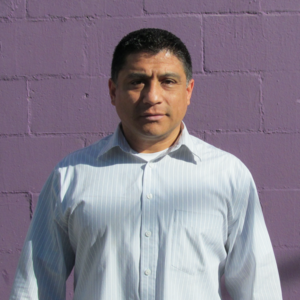by Carlos Alexander Hidalgo
This is the second essay written by Carlos Hidalgo, a member of Freedom for Immigrants’ Leadership Council who has lived in the US since the 1980s. Here, he writes a damning account of his time while detained at Adelanto.
I arrived at Adelanto, which is run by GEO Group, in May of 2013. GEO gets an estimated $300 per day for each detainee. This is to cover housing, meals, toiletries, laundry, uniforms (2), underwear (2), socks (2), shower shoes, a towel and one pair of tennis shoes of such low quality that the soles of the shoes melt on the hot cement floors.
On a scale of 1 to 10, the food at Adelanto was at best a 1. The kitchen staff was careless, to say the least. We were given juices past their expiration dates, apples with worms in them, Jello that tasted like soap, and leftovers cooked differently up to three times in one week.
But the worst was on August 18, 2013. For dinner we were served ground turkey meat, but the meat was so badly spoiled that a very foul smell spread all throughout the dorm. It was so bad some gagged from the smell and others almost threw up when they found maggots in the meat.
They were always short on toilet paper, soap, and small shampoo bottles. The razor blades were so bad that by the time you’re done shaving, your face is all cut and bleeding. You have to return your blades to the GEO officer, but some officers are so careless that they gave us blades already used by someone else. Of course they denied it. This is a multi-million dollar industry and greed supersedes the injustice done to us immigrants in a country founded by immigrants.
The negligence of companies such as GEO goes to prove how much the government cares about us immigrants, without any actual department overseeing GEO’s procedures to supervise Adelanto. They do whatever they want—like having detainees requiring certain special medical care (like those with HIV) housed with the general population and risking the health of others. And they find no problem doing this.
Others were denied basic care for fevers, and cold medicine. The medical department’s solution was always to “drink a lot of water” but the water was so heavy in chlorine and minerals you ended up constipated. All the pleas for help went ignored because the doctor’s primary interest was on keeping GEO’s medical costs down.
Another issue many of us faced was the immoral and unethical practice of many attorneys who lied to our families and filled them with false promises, such as telling them they could get us released if we paid a retainer of $2,500 or more. If our families didn’t give in, these lawyers would go so far as to tell our families that we faced immediate deportation. Many families were left with no choice but to pay, falling victim to these immoral and unethical practices.
It was very sad because even when the evidence of this heartless practice is clear, no one cares to do anything about it, to make sure these attorneys are held accountable for their actions just as much as we are held accountable for ours.
While in detention there was only so much we could do, so we focused our time on fighting our cases ourselves. All we had were each other, in solidarity. We helped one another by translating forms, letters and other documents. Those who understood the law helped others find relief according to their individual cases.
It was amazing to see how we immigrants came together with an intent to overcome our issues, which at times seemed hopeless. But it proves our ability to contribute to this great country with our hearts and undeniable determination to succeed even when the odds are against us.
For example, we find ourselves fighting cases many of us already paid for in criminal court with programs, fines and jail time. Why is it that the primary focus of immigration courts is judging us by our past convictions when considering our requests for bonds? That seems like double jeopardy.
In some cases the convictions are misdemeanors, not violent crimes, but the government leaves a huge discretionary window open for themselves to judge us again, and those convictions automatically become aggravated felonies, making us pay for convictions we’ve already paid for and undermining our local governments. Then we need to worry about coming up with more money to hire an honest attorney to handle our immigration cases, which becomes impossible because once we are released from jail we are immediately transferred to ICE. By then our families are left helpless: wives, sons, daughters, mothers and fathers all wondering what to do and what the outcome will be.
Behind the walls of Adelanto, we all knew what that felt like. Every day we wondered who would be deported next. Most of us didn’t have access to an attorney or legal advice. Every morning we took count of our friends and made sure they were still here. Those who were deported were taken in the wee hours of the morning while we’re all sleeping. There’s that fear among us as if we were kids afraid of the dark and scared that the bogeyman will take us away.
While we waited behind the walls of Adelanto for the outcomes of our cases, all we could do was watch all that we had go down in flames, our families scattered to live with relatives while our children asked and wondered, “When is daddy coming home?”
We weren’t asking for much. Just “liberty and justice for all.”

Carlos Hidalgo is an outspoken immigrant rights advocate. Originally from El Salvador, Carlos has lived in the United States since the early 1980s. He spent over a year and a half at the Adelanto Detention Facility and the Theo Lacy Facility in California, where he helped organize a multi-week hunger strike of over 400 people.
Since his detention, Carlos has advocated for California's Dignity Not Detention Act, lobbied Congressional representatives like Judy Chu (D-CA) to shine a light on the system, and started a petition with over 20,000 signatures calling on news agencies to use the term "immigrant prisons."
Carlos speaks frequently on immigration detention issues, and his work has been featured in major news outlets such as the Los Angeles Times and Rolling Stone Magazine. In 2017, he was featured in Grammy-winning artist Miguel's music video, "Now."

